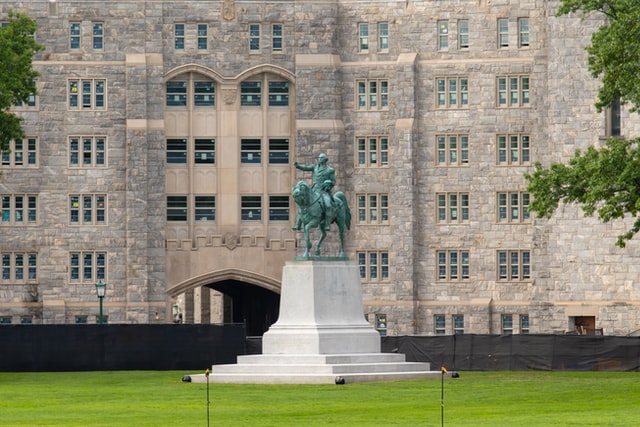Eighteen-year-old Thomas Jackson wanted to get out of the hills of western Virginia and make something of himself. He’d had little time for book learning, and he had little money, but he wanted an education. In 1842, West Point was one of the finest educational facilities in the country and probably the top engineering school in the world. And it was free.
The problem was that each congressional district could only send one student a year to the academy, and three other young men were vying for the opening. The district representative, Samuel Hayes, decided to have the four young men take a math test to determine the best candidate.
Jackson’s friend, Gibson Butcher, won the competition and headed for New York. However, Butcher took one look at the school and headed back home as soon as he heard about long list of the rules, the demanding classes, and the strict discipline.
He showed up at Jackson’s house and told him he was welcome to give it a try. Jackson didn’t waste any time. With the deadline for the arrival of new students looming, he gathered letters of recommendation and hopped on his horse to catch the stage and then the train to Washington, D.C. He’d need the signatures of Hayes and the Secretary of War before he could be accepted as a student. Many of his friends doubted he had the educational ability to succeed at this prestigious school, but they agreed that he outranked everyone when it came to determination and persistence.
Congressman Hayes was a little startled to see the young man with dirty saddlebags standing in his office digging out papers and declaring himself as the new candidate for West Point, but in the end, Jackson received the needed signatures and hastened to the backwoods of New York.
Once he arrived at West Point, he faced an even greater challenge: a mathematics entrance test that would determine who stayed and who would be sent home. The examiner expected the candidates to know fractions and proportions, etc., and Jackson could barely add up a line of numbers. To make matters worse, a fellow wasn’t allowed to fail quietly and secretly at his desk. Each student had to march up to the chalk board and scribble his solutions for all to see.
According to witnesses, “Sweat streamed down Jackson’s face. He swiped at the pouring perspiration with the cuffs of his coat, first the right sleeve then the left as he labored at the board” (13). His struggle was excruciating for all to watch, but his tenacity was evident.
When the academic board posted the list of those who had been accepted, Jackson’s name was on the bottom, but it was there. He’d barely made it.
The shy, awkward, young man who studied by firelight until the wee hours of the morning and whose iron-clad self-discipline and perseverance became legendary probably had no clue about being a soldier before he entered the academy, but he went on to become one of the most respected and well-known generals of the Civil War: Stonewall Jackson.
Source:
Waugh, John C. The Class of 1846: From West Point to Appomattox. Warner Books, 1994.


I so enjoyed this.
Thank you!
Oh my, so much math. Good for him.:)
This is a great anecdote about a great general and devout Christian. Thank you for sharing this.
Yes, Stonewall Jackson was a man of faith who loved the Lord and who sought to live by God’s Word.
Yes, I definitely wouldn’t have been able to handle the math. I’d never realized that West Point had such an engineering focus. WP grads oversaw and planned much of the building of the country’s infrastructure in the mid-nineteenth century.